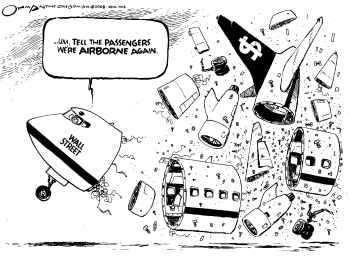- MENU
- HOME
- SEARCH
- VIDEOS
- WORLD
- MAIN
- AFRICA
- ASIA
- BALKANS
- EUROPE
- LATIN AMERICA
- MIDDLE EAST
- United Kingdom
- United States
- Argentina
- Australia
- Austria
- Benelux
- Brazil
- Canada
- China
- France
- Germany
- Greece
- Hungary
- India
- Indonesia
- Ireland
- Israel
- Italy
- Japan
- Korea
- Mexico
- New Zealand
- Pakistan
- Philippines
- Poland
- Russia
- South Africa
- Spain
- Taiwan
- Turkey
- USA
- BUSINESS
- WEALTH
- STOCKS
- TECH
- HEALTH
- LIFESTYLE
- ENTERTAINMENT
- SPORTS
- RSS
- iHaveNet.com: Economy
by Paul A. Samuelson

The number-one question preoccupying economists, policy agents of government and Main Street families is this:
Will "recovery" from the current U.S. financial meltdown arrive before the end of 2009? Or, failing that, will it at least arrive early in 2010?
Observers outside the U.S. -- in Europe, Asia and South America -- are hopeful that the U.S. locomotive will begin to stimulate global demand.
To the surprise of many of us macroeconomists, so far the index of stock prices around the world has resisted persistent bear market wipe-offs.
Yes, real estate prices are still falling from their previous up-bubble heights. Yes, new building starts for home, offices and factories are not yet growing on a net basis.
Yes, previous misleadingly optimistic profit reports of banks, insurance companies and corporations are still being followed by admitted shortfalls of realizations.
Of course, global stock prices could be expected to sink in a bear market. And in 2008 and 2009 that did often happen.
However, in the very last months of 2009, there has been a considerable rise in share prices toward pre-meltdown levels. Such early recoveries were rather rare in economic history.
After America's October 1929 Wall Street collapse, it took years and even decades for the Dow Index to re-attain its 1929 peaks. There is no great mystery about this. What has been so different from President Hoover's 1929 inaction has been the unorthodox stimulating interventions by Federal Reserve Chairman Ben Bernanke and President Bush's Treasury chief, Henry Paulson.
They pumped government funds into distressed financial institutions on an unprecedented scale.
Whenever some several hundreds of billions of dollars infusions were not enough, they pumped in still more.
I should digress to commend Chairman Bernanke for his flexibility. At the beginning of his Fed chairmanship, Bernanke focused mainly on the importance of inflation control and transparency.
However, in more than a quantum leap from there to unorthodox central bank action, focus became aimed toward propping up a sinking society.
Would former Chairman Alan Greenspan have been similarly flexible and quick-acting? We can never know.
With the sweeping 2008 Democratic Party victory, under candidate Barack Obama the Federal Reserve gained help from Congress and the executive agencies.
Has the good and diversified team of President Obama achieved a quick victory over mass unemployment and sagging consumer and industry spending?
No. Of course not. Rome was not built in a day.
In the stormy years of 1933-1939, Franklin Roosevelt's New Deal intervention needed more time to end the inherited 1929-1933 depressions.
I return now to the current scene in 2009, here in America and three other continents. So far the U.S. seems quicker off the starting blocks than the European Union.
The Bank of England did come to act, but only after some hesitation. The European Central Bank in Frankfurt, after some grudging delays, did also slash significantly the shortest term interest rates in Europe.
When one tells the story of almost universal bad news, sometimes it is well to take notice of the few nations that have been able to avoid bad meltdowns and Main Street slumps. Two good examples have been Norway and Chile.
When North Sea oil splashed Norway with vast revenues, that country wisely saved for the future. Similarly, when world copper prices enriched Chile, that country husbanded those windfalls. Yes, both did then have blind luck. But they, so to speak, hoarded it.
By contrast, Ireland and Iceland were two of the high fliers during the up-bubble years. Then, on one Tuesday Icelanders were the happiest people in the world. On a later Thursday, they were the most miserable when their few major banks went kaput. In Ireland, and Spain, too, the populace learned the hard way about Isaac Newton's Law of Action and Reaction: What goes up can also go down.
History cannot be counted on to repeat itself. Right now, despite the continuing stream of mixed woes, Mr. Bernanke expects a possible end to the recession by 2009's end, or soon after. He is not alone in this view. Most brokers who peddle stocks and bonds publicize this same view.
My own expectations are more guarded.
Yes, there could be a rise in real GDP just around the corner. Yes, the official-unofficial National Bureau of Economic Research Committee that gives dates to recoveries and recessions might one day declare that our current recession did end late in 2009.
But when that end comes, could it not be followed by continued weakness in (a) available jobs, and (b) spendable wealth by consumers and investors, as well as a continued cascade of bankruptcies?
Call this the 1990-2009 Japanese pattern of "lost decades."
If our next recovery is such a weak one, the history books will paint a dismal picture of George W. Bush's two terms in the White House.
© PAUL A. SAMUELSON; (TM) TRIBUNE MEDIA SERVICES, INC.
WORLD | AFRICA | ASIA | EUROPE | LATIN AMERICA | MIDDLE EAST | UNITED STATES | ECONOMY | EDUCATION | ENVIRONMENT | FOREIGN POLICY | POLITICS
Happy Economic Recovery vs. An Anemic One | Paul A. Samuelson